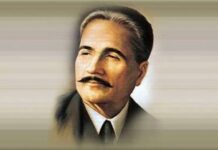One political hero in Sindhi society was Fazil Rahu (1934-1987). His activism went back to the 1950s and 1960s when the Kotri barrage in lower Sindh was constructed and barren lands were allotted to retired and in-service men, hailing from everywhere else but the area itself.
Fazil’s political life was spread over three decades; there were many movements when he stood out as the sole force of resistance. Essays, books and memories that his comrades have written following his assassination shed light on his political career. Gen Ayub, Yahya, Bhutto and Gen Zia, all put him behind bars for several years for his political struggle.
Fazil Rahu represented a true grassroots people’s movement. Despite hailing from a small landlord family, he disowned his own landowner class, and associated, led and sacrificed for the peasant class. After Haider Bux Jatoi, Fazil was the second socialist leader who not only had an understanding of the class character of society, but who worked to liberate the peasantry and unite them.
In the early days of the Movement for the Restoration of Democracy (MRD), Fazil was the senior vice president of the Awami National Party (ANP). The party refused to be part of the MRD, but Fazil mobilized people to be part of the historic struggle. To him, when the people were fighting one of the cruelest dictatorships in the country’s history, they could not be left alone. In the 1970s and onwards Fazil enjoyed the unwavering support and love of his native town’s people, mainly because when oil and gas exploration companies took over the lands of his people, and they were being denied compensation, he stood for and with them. Fazil is unique; he is remembered for his revolutionary grassroots work, his courageous stand against land auctions etc.
He saw their very survival at stake had he not built a movement around those issues. Fazil left an indelible mark of his sacrifice and passionate political struggle on the minds and hearts of his people. On January 17, 1987, at dawn, Fazil Rahu was assassinated at the age of 53.
Rahu was assassinated at a time when he had become one of the most prominent leaders of the Movement for Restoration of Democracy (MRD) in the country. Thousands come every year to his last resting place in Rahuki, but this has become only a ritual.








